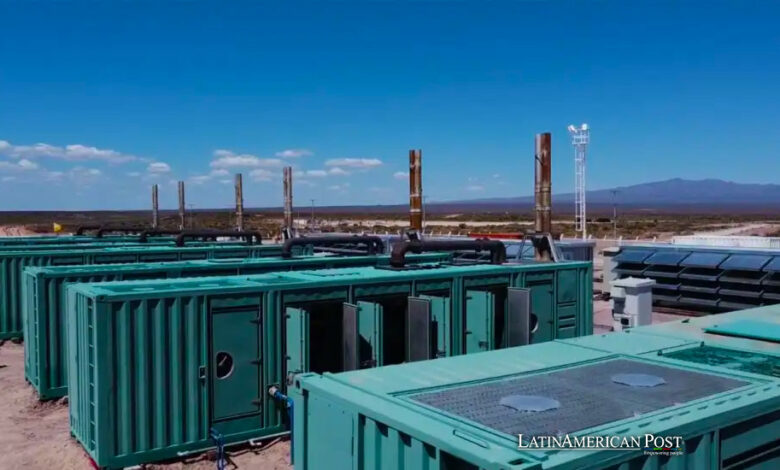Argentina Powers Bitcoin Mining with Innovative Energy Project

YPF Luz, a significant energy producer in Argentina, has launched a thermal power plant in Neuquén, utilizing excess gas from oil operations to supply electricity for large-scale bitcoin mining by Genesis Digital Assets.
In the resource-rich province of Neuquén, Argentina, a groundbreaking initiative has emerged at the intersection of traditional energy sectors and the burgeoning field of cryptocurrency. YPF Luz, alongside partners including the state-controlled oil company YPF and Norwegian oil giant Equinor, has unveiled the Bajo del Toro thermal power plant, which will channel excess gas from the Vaca Muerta shale formation into electricity specifically for bitcoin mining operations. This venture reflects a novel use of flare gas and positions Argentina as a critical player in the global digital currency landscape.
Harnessing Vaca Muerta’s Potential
The Vaca Muerta formation, located in the southwest of Argentina, is one of the world’s largest reserves of unconventional hydrocarbons. The utilization of flare gas, a byproduct of oil extraction typically burned off and wasted, marks a significant step towards environmental sustainability and efficiency. By converting this excess gas into a valuable energy resource, the Bajo del Toro plant supports the region’s energy needs and the operations of Genesis Digital Assets Limited (GDA), a significant player in the global bitcoin mining industry.
The power plant boasts an installed capacity of 8 megawatts and is a pivotal development for GDA’s first data center in South America. Nestled in Rincón de los Sauces, this facility will power approximately 1,200 cryptocurrency mining machines. This setup enhances the efficiency of Bitcoin mining operations and reduces the carbon footprint associated with using traditional power sources.
Abdumalik Mirakhmedov, the CEO of Genesis Digital Assets, expressed enthusiasm about the project, noting, “We believe Argentina is an important country for Bitcoin mining, given its abundance of energy sources and its business-friendly environment. Opening our first data center in South America is a significant step in our geographic diversification efforts.”
This development indicates a broader trend across Latin America, where nations increasingly leverage local resources and technological advancements to attract foreign investment and foster high-tech industries. Argentina, in particular, has been at the forefront of this movement, with its rich natural resources and a strategic approach to technological integration into traditional sectors like energy production.
Public-Private Collaboration for Innovation
The collaboration between YPF Luz, Equinor, and GDA symbolizes how the public and private sectors can align to drive innovation. The project is supported by investments from significant global players such as the American conglomerate General Electric and China’s Silk Road Fund, highlighting international confidence in Argentina’s market potential and technological capabilities.
However, the project has its challenges and criticisms. Environmentalists express concerns about the long-term impacts of extensive hydrocarbon exploitation and the sustainability of large-scale bitcoin mining, which is notoriously energy-intensive. Additionally, the economic volatility of cryptocurrencies and their regulatory future pose risks to the stability and predictability of such investments.
Despite these challenges, the Argentine government has committed to supporting renewable energy and technology-driven projects that promise economic growth and innovation. The country’s legal and regulatory frameworks adapt to accommodate new technologies and business models, creating an environment conducive to projects like the Bajo del Toro plant.
As Argentina continues to navigate the complex dynamics of global energy demand, technological innovation, and environmental stewardship, projects like this thermal power plant serve as testaments to the country’s strategic vision. They harness natural resources more effectively and propel Argentina toward a more sustainable and technologically advanced future.
Global Implications and Model for the Future
The implications of this initiative extend beyond national borders, offering a model for other countries in Latin America and worldwide. By integrating renewable energy practices with high-growth industries like cryptocurrency, nations can catalyze economic development while addressing global energy challenges.
Also read: Argentina’s Pope Francis to Address AI Ethics at G7 Summit in Italy
As the Bajo del Toro project progresses, it will likely attract further international attention, both for its innovative approach to energy use and its contribution to the evolving landscape of global digital finance. For Argentina and its partners, the successful operation of this plant could herald a new era of energy strategy that marries industrial heritage with the digital future.





